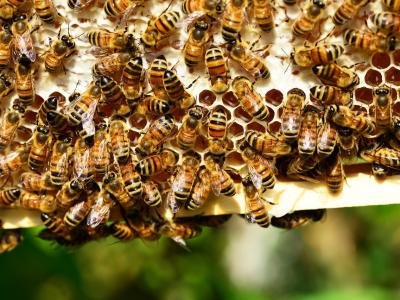Bee populations have drastically fallen. According to the USDA, there are about 2.5 million managed honey bee colonies today, compared to 5 million in the 1940s. Simultaneously, the need for honey bee colonies has actually increased.
It is well known that we rely on honey bees for our food. In fact, these pollinators are believed to be responsible for about $15 billion of increased crop value per year. In January, a paper published in the journal Science found that attracting more bees (honey bees and wild species) could help farms increase crop yields by a median of 24%. The United Nations Food and Agriculture study compared 344 plots across Africa, Asia, and Latin America, and found that crop yields were notably lower in fields that had less visits from pollinators, than the fields that attracted more pollinators. The positive influence of pollinators was more apparent in small-scale farms rather than big, likely due to the fact that bees prefer not to travel far.
A statement from the FAO says that the paper “makes the case that ecological intensification – or boosting farm outputs by tapping the power of natural processes – is one of the sustainable pathways toward greater food supplies.” Furthermore, there are large implications for the potential of small-scale farmers, especially in developing nations, to utilize the free service of bees.
The largest takeaway from the study is that bees provide a tangible agricultural service that needs to be taken into account when we plan for food security. In fact, the FAO statement says the study found that even more so than other management practices, the agricultural input that impacted crop yields the most was pollination. The challenge now is determining how we will move forward with this information. The statement includes some suggestions on how farms can attract pollinators, such as maintaining habitat and forage resources all year long.
If you want to help improve wild pollinator habitat at your home, the U.S. Fish and Wildlife Service has some tips on how you can help pollinators of all species. Small-scale farms already benefit and help protect pollinators more than their large-scale counterparts, but there are lots of things that farmers and others alike can do to help protect the bees, and in turn, our food security.
What do you think? Are you surprised by the advantage pollinators provide? How do you think we can protect declining bee populations?
It is well known that we rely on honey bees for our food. In fact, these pollinators are believed to be responsible for about $15 billion of increased crop value per year. In January, a paper published in the journal Science found that attracting more bees (honey bees and wild species) could help farms increase crop yields by a median of 24%. The United Nations Food and Agriculture study compared 344 plots across Africa, Asia, and Latin America, and found that crop yields were notably lower in fields that had less visits from pollinators, than the fields that attracted more pollinators. The positive influence of pollinators was more apparent in small-scale farms rather than big, likely due to the fact that bees prefer not to travel far.
A statement from the FAO says that the paper “makes the case that ecological intensification – or boosting farm outputs by tapping the power of natural processes – is one of the sustainable pathways toward greater food supplies.” Furthermore, there are large implications for the potential of small-scale farmers, especially in developing nations, to utilize the free service of bees.
The largest takeaway from the study is that bees provide a tangible agricultural service that needs to be taken into account when we plan for food security. In fact, the FAO statement says the study found that even more so than other management practices, the agricultural input that impacted crop yields the most was pollination. The challenge now is determining how we will move forward with this information. The statement includes some suggestions on how farms can attract pollinators, such as maintaining habitat and forage resources all year long.
If you want to help improve wild pollinator habitat at your home, the U.S. Fish and Wildlife Service has some tips on how you can help pollinators of all species. Small-scale farms already benefit and help protect pollinators more than their large-scale counterparts, but there are lots of things that farmers and others alike can do to help protect the bees, and in turn, our food security.
What do you think? Are you surprised by the advantage pollinators provide? How do you think we can protect declining bee populations?






